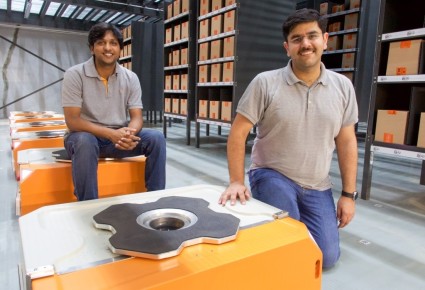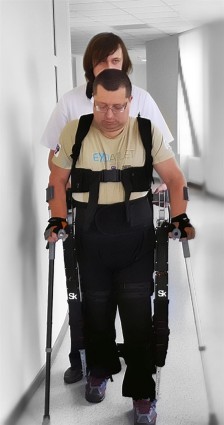
Robohub.org
Robohub Digest 08/15: Jibo gets Asian funding, Russian exoskeleton gets clinical trials, and Hitchbot loses its head
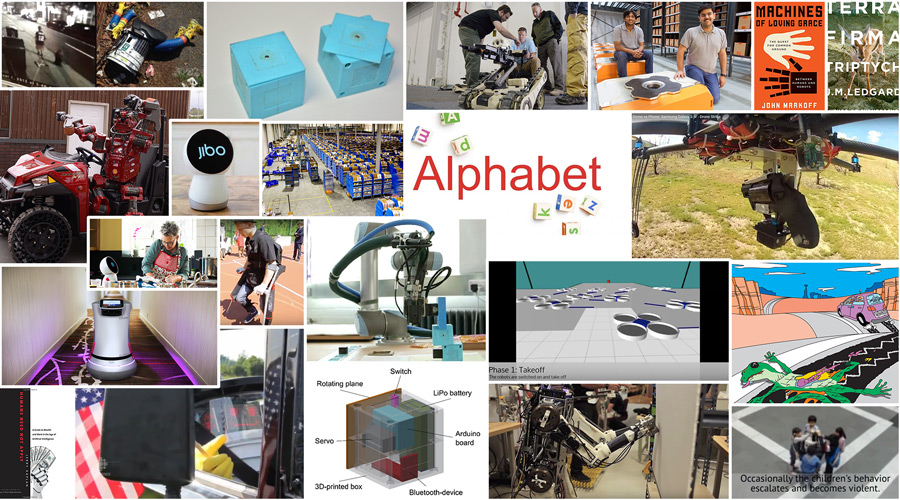
A quick, hassle-free way to stay on top of robotics news our robotics digest is released on the first Monday of every month. Sign up to get it in your inbox.
Money flowing into robotics startups
Money was flowing into robotics startups this August. You’ll recall that in July, Softbank’s Pepper gained a rival when Japanese telco NTT announced it was launching a competing consumer robot called Sota. Well, now a third consumer robot is entering the frey: this month Boston-based Jibo received $11 million from leading Asia-Pacific investors to bring its robotic smart assistant to Asian markets. Although a full version is not available just yet, the investment means that Jibo is now poised and ready to go on sale in Asia as soon as the robot is ready.
Also this month, GreyOrange – a company focused on materials and handling based in India and Singapore – received $30 million to produce more of its Butler mobile robot. Similar to Amazon’s Kiva Systems robot, Butler is a shelves-to-picker robot system designed to support transportation and logistics in warehouses. Frank Tobe asks: Does their technology infringe on Kiva’s IP?
Meanwhile in the US, Carnegie Mellon University and GE Ventures announced a for-profit $20 million venture fund, coupled with a new accelerator program called “The Robotics Hub”, which aims to bring leading robotics firms to Pittsburgh. The Robotics Hub will also help CMU’s robotics institute to spin off ideas from their lab. (We couldn’t help but notice that the name of the program shares astonishing similarities with a certain non-profit online communication platform focused on robotics news and developments.)
Combined with the many trade shows, conferences and reports of sales records, investments such as these seem to be building the business case for robotics. And some are taking a bet on it: the InterContinental Group just introduced Savioke mobile delivery robots at the 300-room Crown Plaza in Silicon Valley, hoping to showcase the cutting-edge technology produced in the region (not to mention offering guests a unique experience).
Research buzz
A team of scientists have begun a clinical field trial of Russia’s first medical exoskeleton, the ExoAtlet-Med. Backed by Skolkovo, this is the first exoskeleton from Russia, and the scientists hope the trial will enable them to demonstrate its ability to support movement and rehabilitation in patients with restricted limb function or spinal injury.
Elsewhere, experts in swarm robotics have developed a new programming language for heterogeneous robot swarms called Buzz. This novel language allows developers to create, modify and disband swarms as needed, with the freedom to choose the most appropriate approach to behavior development and learning.
Biologists have long hoped to learn more about cooperation and complex social behaviors in nature from robot swarms. Digital antlike robots created by a team of computer scientists at Aberystwyth University in the United Kingdom have now brought them one step closer to this goal. The robots mimic leafcutter ants and allow scientists to explore how cooperation and division of labour might evolve over hundreds of generations.
Another research team is looking at evolution, too, but this time the evolution is in the robots themselves. In their paper, the researchers from Zurich and Cambridge describe how they built a robot arm that creates “babies” that are better adapted to their surroundings than their “mother” – and all this without human input. Fascinating as this may sound, lead researcher Dr Fumiya Iida reassures us that the days of robots independently producing superior offspring are still a long way off.
Finally, it’s not just us humans who can learn from robots. MIT’s new robot called “Hermes” borrows its quick and graceful reflexes from a human controller. Hooked up to the human pilot, it mimics the controller’s movements in real time. In future, this robot may be useful to support search and rescue operations.
Robocar roundup
This August Google X was made a subsidiary of the new Alphabet holding company, which is no longer part of the Google family. Brad Templeton (Robocars.com) explored what the decision means for Google’s robocars and came to the conclusion that, despite a number of drawbacks, the move could be a positive one.
And at Bloomberg Business, Noah Buhayar and Peter Robinson discussed whether the insurance industry will survive autonomous cars. Arguing that increased autonomy will result in fewer accidents and a subsequent drop in insurance premiums, they warn that if the industry does not adapt, it will nosedive.
Killer robots
Last month’s debates on killer robots, including IJCAI’s open letter calling for a ban on offensive autonomous weapons and Elon Musk’s investment in research to keep “AI robust and beneficial”, sparked further discussions this August. In an article in The Conversation, for example, the authors encouraged researchers to engage with military robots and to ensure that these robots act as ethically responsible as possible. Also in response to the open letter, Erik Sofge argued that a ban on killer robots is inevitable, and critically explored what such a ban could look like.
Hitchbot’s demise
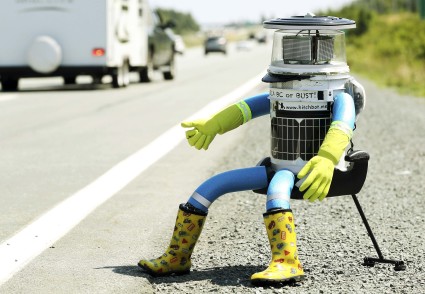
Following successful trips across Canada, Germany and the Netherlands, Hitchbot was supposed to trek across the US from Boston to San Francisco, but the robot was found decapitated in Philadelphia, bringing its latest trip to an abrupt end. The ensuing hunt for Hitchbot’s killer heated up when one of its last companions’ claimed to have found a video showing Hitchbot’s attacker. However, the video turned out to be a hoax, even if Hitchbot’s unseemly decapitation was not.
Hitchbot’s family, a group of researchers from Canada, soon confirmed that the robot was beyond repair. A Kickstarter campaign to revive Hitchbot (started by some Philadelphia techies bent on restoring their city’s honor) far exceeded its goal, but was soon cancelled when the Canadian research team said that it was still deciding what to do next.

An untimely end.
The robot’s earlier adventures stand in stark contrast to its violent and untimely end. But Hitchbot knew the risks and continued on its journey in spite of them: designed primarily as a social experiment, some argued that it was only a question of time before Hitchbot met its demise. Whatever the reason for the attack, Hitchbot’s travels and even his destruction have taught us much about human behavior, just as the researchers intended. Talking about their loss, the researchers highlighted the many questions the robot helped to answer, and discussed possible future incarnations for the project.
If Hitchbot is indeed resurrected, we suggest that before it sets off on another journey it should get some self-defense lessons from this Tokyo robot that has learned to avoid bullies and flee from physical abuse.
New books
Several new books on robotics came out this August.
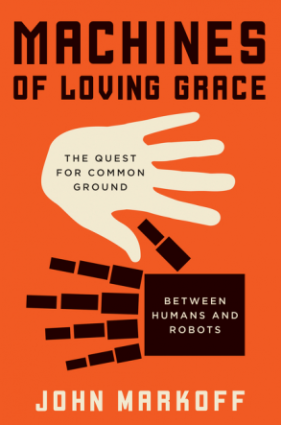 First among them is “Machines of Loving Grace” by Pulitzer-Prize-winning science writer John Markoff, which examines the history of automation and explores the paradox between “artificial intelligence” (AI) and the more human-centered concept of “intelligence augmentation” (IA). Jerry Kaplan’s “Humans need not apply: A guide to wealth and work in the age of artificial intelligence” reviews advances in machine learning and artificial intelligence and looks at how these have (and will) transform the world economy. And author Murray Shanahan takes on the Singularity debate in his primer “The Technological Singularity”, outlining a series of scenarios that raise philosophical, ethical and pragmatic questions we, as a society, should consider.
First among them is “Machines of Loving Grace” by Pulitzer-Prize-winning science writer John Markoff, which examines the history of automation and explores the paradox between “artificial intelligence” (AI) and the more human-centered concept of “intelligence augmentation” (IA). Jerry Kaplan’s “Humans need not apply: A guide to wealth and work in the age of artificial intelligence” reviews advances in machine learning and artificial intelligence and looks at how these have (and will) transform the world economy. And author Murray Shanahan takes on the Singularity debate in his primer “The Technological Singularity”, outlining a series of scenarios that raise philosophical, ethical and pragmatic questions we, as a society, should consider.
 At the other end of the spectrum, Jonathan Ledgard, former Africa correspondent for The Economist walks readers through his vision of how robotics – and cargo drones specifically – could transform the African continent and its economy. In a series of three essays, titled Terra Firma Triptych, Ledgard builds on his journalistic practice tracking the mass adoption of mobile phones throughout Africa, and predicts that cargo drones could have a similar impact on the region’s economy and productivity by bringing goods into regions where roads are poor or non-existent.
At the other end of the spectrum, Jonathan Ledgard, former Africa correspondent for The Economist walks readers through his vision of how robotics – and cargo drones specifically – could transform the African continent and its economy. In a series of three essays, titled Terra Firma Triptych, Ledgard builds on his journalistic practice tracking the mass adoption of mobile phones throughout Africa, and predicts that cargo drones could have a similar impact on the region’s economy and productivity by bringing goods into regions where roads are poor or non-existent.
Events
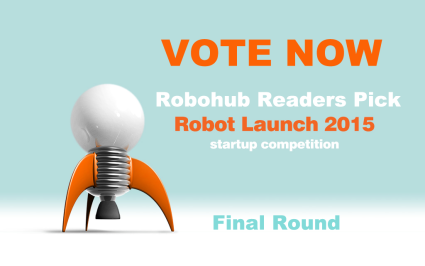 The Robot Launch finals will be held on Friday Sept 18 when a selection of great startups will pitch live to an investor panel. Are Robohub readers on the same wavelength as our expert panelists? This week is the final vote for the Robot Launch “Readers’ Pick”, so vote now to have your say.
The Robot Launch finals will be held on Friday Sept 18 when a selection of great startups will pitch live to an investor panel. Are Robohub readers on the same wavelength as our expert panelists? This week is the final vote for the Robot Launch “Readers’ Pick”, so vote now to have your say.
Other events this month to watch for:
- IFA Consumer Trade Show– Berlin, Germany – Sep 4-9
- IMA Conference on Mathematics of Robotics – Oxford, UK – Sep 9-11
- InterDrone – Las Vegas, USA – Sep 9-11
- Robo-Revolution – Karnataka, India – Sep 12-15
- Drone Apps Conference – Lausanne, Switzerland – Sep 14-15 (Use the discount code “Robohub” when registering for a 150CHF discount at checkout.)
- euRathlon Challenge – Piombino, Italy – Sep 17-25
- Robot Launch Finals – Robohub – Sep 18
- RoboBusiness – San Jose, CA, USA – Sep 23-24
- IROS – Hamburg, Germany – Sep 28 – Oct 4
- RTEX – Dubai, UAE – Sep 29 – Oct 1
Miss a previous digest? Don’t worry! Check out our archives.
tags: Robohub Digest


